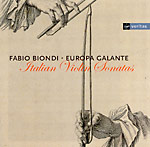This is a lovely program that will be of interest to all listeners with even a passing interest in music of this genre and period. In addition to the rarely-heard Locatelli sonata, Baroque fiddler extraordinaire Fabio Biondi and Europa Galante offer very welcome CD premieres by equally renowned contemporaries Geminiani, Veracini, Tartini–and to a slightly lesser extent (though no less accomplished), Mascitti.
As its title suggests, the opening Sonata Prima by Veracini is a grand work both stylistically and, given the composer’s reputation as one of the foremost virtuosos of his day, technically challenging. Biondi maneuvers through the widely diverse first movement “Overtura” with great panache, subtlety, and versatility, his phrasing remarkably keen and convincing, heightened with numerous inventive accents and skillful ornamentation. Likewise, Biondi’s negotiation of the rapid-fire staccatos in the third movement “Paesana” and the often-severe rhythmic delineations of line featured in the final “Giga del Postiglione” are a marvel.
Locatelli’s Sonata in D minor also receives a vital performance that marginally surpasses the otherwise fine version by Elizabeth Wallfisch and the Locatelli Trio on Hyperion–in particular, Biondi’s bowing is crisper and more urgent sounding (most notably in the second and fourth movements). Tartini’s Sonata in G minor also benefits both from Biondi’s expert articulation and, especially here, his continuo choices. For instance, the broad first-movement Largo owes much of its moving affect to the use of organ and theorbo.
Arguably the most fascinating work offered is Michele Mascitti’s Psyché, a charming 10-movement, not quite 17-minute, sort-of chamber “acte de ballet”. Though Neapolitan by birth, Mascitti eventually moved to Paris and became a French citizen, apparently thoroughly absorbing the French style–hence Psyché sounds more as if it had been skillfully penned by the likes of Lully, Rameau, or Couperin. The initial stately dialogue that evolves between Biondi and cellist Maurizio Naddeo in “Les vents” is ravishing. The brief though very witty “L’amour en courroux au désespoir” begins with a lively torrent of brusque bowing, sharply coming to a halt, then all but petering out in sublime flourishes of resignation. Mascitti’s brilliant little work couldn’t be more delightful. Virgin’s sound is excellent, with all the instruments sufficiently detailed yet set in a slightly roomy acoustic space. Highly recommended. [8/2/2003]
































